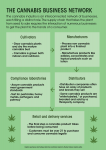Thirty years ago, buying cannabis was difficult, expensive and illegal. Buying cannabis in 2019 is somewhere between picking up a prescription from a pharmacy and buying beer from a liquor store. Join columnist John Tudhope each week as he visits cannabis companies in Los Angeles and discusses the budding industry.
As I reach the end of my collegiate tenure, the phrase “networking event” has forced its way into my psyche.
Such events – hosted for young professionals to find contacts and learn about the latest industry news – are especially valuable in the world of cannabis because the industry itself is young, expanding and in need of talent.
A few months ago, I went to a monthly meetup hosted by the Southern California Cannabis Business Investment Group, and was introduced to a variety of companies and business owners involved in the cannabis industry. The event featured an industrial agriculture technology company, an edible manufacturer and a cannabis waste disposal company.
It was an eclectic group of cannabis professionals in a downtown venue, all vying to meet other insiders and interested consumers. Each month, SCCBIG chooses a group of speakers to discuss their business and to field questions from the audience about the industry.
When I went to their December meetup to learn about the cannabis industry, most people were in collared shirts or nice blouses, casually mulling around and discussing cannabis technology, products and news. The vibe of the room was professional, but did not feel pretentious or exclusive – this was a cannabis event, after all. The event featured a slate of businesses set up with tables, a presentation area and a bar serving grilled sandwiches, wine and beer.
SCCBIG was founded three years ago by entrepreneur James Jordan as a forum to connect cannabis investors with businesses looking for capital. Since then, Jordan said the events have created a tight-knit community of people interested in learning about the industry.
“People would show up and they wanted not just information on investments, but they wanted an education, they wanted to learn,” he said. “What originally started as a meetup group to find investors turned into a teaching platform.”
When I attended, the presentations covered cryptocurrency in the cannabis industry, the role of cannabis waste companies and cannabis insurance. While I didn’t buy what the last speaker had to say about the massive future of blockchain currency, I can see the value in creating a forum that provides important information about such a misperceived industry as cannabis.
“We are trying to predict with our speakers and our conversations where the market is going to head so that people can prepare for that,” Jordan said.
Students on campus have also created networking platforms for the cannabis industry. Eugenio Castro Garza, president of UCLA’s Cannaclub, said the club was created for two reasons – providing objective, science-based information about cannabis and connecting students with job opportunities in the industry.
Cannaclub sets up trips to businesses such as a testing laboratory and gives students the chance to engage with the industry in a hands-on manner. They have had speakers such as a cannabis investor and a government official overseeing cannabis in LA, as well as a panel about women in cannabis.
These groups are invaluable in the infant cannabis industry, where innumerable business deals and opportunities are presenting themselves daily. For me, both SCCBIG and Cannaclub did exactly what they aimed to do – they introduced me to businesses that I have featured in my writing about cannabis and gave me information about where the industry is headed.
As a student journalist, it is necessary for me to get in touch with business owners, and as I approach graduation, they may even become my pathway to employment. Now I just have to figure out how to tell my grandparents I may work with a drug they grew up thinking made people insane.
